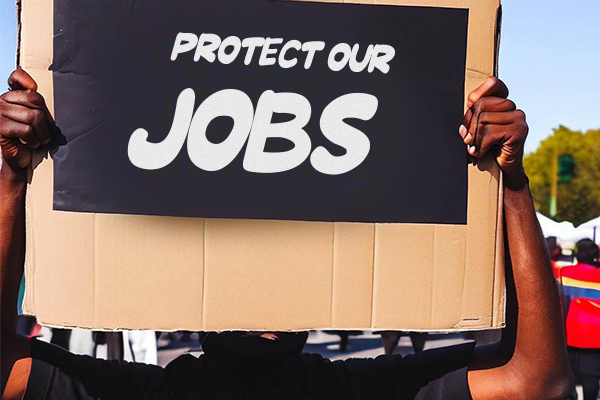Laws and regulations are made to guide the activities of societies and various sectors. But in a tale that is arguably as old as their existence, innovation always seems to be several steps ahead. While this has been known to cause some friction, a policy expert points out that it has had both positives and adverse effects.
At the recently-concluded Techpoint Build 2020, Titi Akinsanmi, Google’s Policy and Government Relations Lead for West & Francophone Africa, stated that historically, policies have consistently played catch-up to regulations.
Regulations are adjusted almost every time there's an innovation, but in the age of digital technologies, the cycle becomes a bit more complicated; and policymakers have found the new frontiers of business a little bit more puzzling.
Perhaps, the most obvious example is the difficulty in taxing tech companies. Since they can expand on a global scale without having to set up physical offices, old and new taxation laws haven't provided a suitable solution.
A few months ago, Kenya and Nigeria put laws in place to tax the digital economy, but a major puzzle was implementation. As seen in France, and more recently, Kenya, even when the technological processes are in place, diplomatic relations could be a significant hurdle.
Coming down to the regional levels, the regulatory environment for innovative businesses is a bit tougher. There are a few positive and, most times, negative outcomes.
When regulations are enforced in Africa
Over the years, the presence of regulations in most African countries generates an air of uncertainty. There are public outcries against those that are stifling, and the seemingly progressive ones are greeted with a healthy dose of scepticism.
Admittedly they are essential, but such stifling regulations have bred a culture of mistrust and scepticism whenever the government sets its sights on sector regulation. The various instances have been well documented over the years.

Be the smartest in the room
Give it a try, you can unsubscribe anytime. Privacy Policy.
In a move that the government has since claimed it would review, an amendment was made to the country’s broadcasting code to bring an end to content exclusivity.
In 2020, Lagos, Nigeria’s commercial and economic hub, has seen its fair share of regulatory tussles in the ride-sharing sector. The ban on commercial motorcycles (Okada) and Tricycles (Keke) in January 2020 effectively put a halt to the activities of startups that based their business model on solving the problem of traffic congestion.
According to Akinsanmi, if the government is not prepped for the entrance of the digital into the world of business, such policies would emerge as they try to make sense of the situation.
Besides policymakers, those enforcing the law are ill-informed of these intricacies. For context, look no further than the harassment of tech workers or the recent issue with logistics providers in Lagos.
However, it has not always been all bad.
Because of the cooperation between the public and private sectors, Africa currently has a glut of subsea cables, with more to come from Facebook and Google. However, one problem is that most of this capacity does not get to the hinterlands where it is needed.
Akinsanmi also points out that save for a few countries, significant strides have been made in infrastructure sharing -- a cost-effective way to deepen network penetration in unreached locations -- in Africa.
Cloudy skies and a silver lining

Photo by AbsolutVision on Unsplash
We previously highlighted the importance of tech entrepreneurs having to innovate without waiting for favourable regulations. But given the results so far, it would be difficult to find any positives that could come from that cycle.
Innovators have continued innovating, and regulators keep coming up with reactionary policies that do not help the sector.
However, Akinsanmi insists that a truly innovative entrepreneur should always account for the possible regulatory hurdles that might come up when building a solution. For her, entrepreneurs should not just carry on with their business while ignoring regulators in the process.
"Having these policies, or sometimes a lack of them creates these opportunities for innovation," she said.
For her, early engagement with regulators will ensure that these innovations continue thriving
Akinsanmi also believes that there is a place for failed policies as they present an opportunity for everyone to learn. In today’s data-driven economy, leveraging the current opportunities in regulations will ensure that they enable, rather than stifle, innovation.
"Regulatory gaps present an opportunity for us to shape them in a way that does not stifle innovation, this means that when we finally put the policies together, we make sure that the laws are not prescriptive in nature."
She explained that this way, the laws are not just addressing a particular technology, but also the possibilities in the future with the use of data. When this happens, policies will still be able to influence future technology.
Most of the African continent remains uncharted territory, and Techpoint Africa's West African Decade Report shows that Internet entrepreneurship outside Nigeria is relatively low.
By Akinsanmi's logic, the solutions currently being built from existing regulations or a gap in regulations present an opportunity for entrepreneurs.
Besides entrepreneurs, the end-users of these technologies also deserve a seat at the table where regulations are made. When everyone is invested as a stakeholder, one can hope for more positive outcomes from regulations in the future.
Photo by Tingey Injury Law Firm on Unsplash
https://zp-pdl.com/get-quick-online-payday-loan-now.php http://www.otc-certified-store.com/hypertension-medicine-usa.html https://www.zp-pdl.com https://zp-pdl.com/online-payday-loans-in-america.php займ через contactчастный займ под расписку спбзайм у физического лица




















